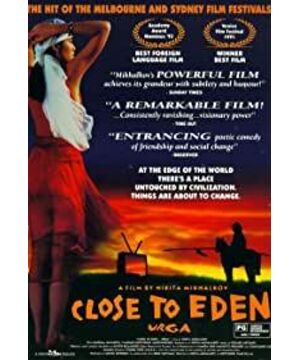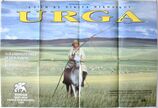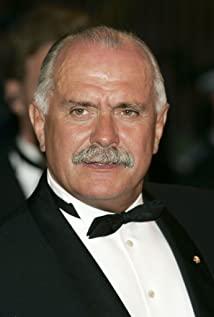"Urga" is Mongolian, meaning to set a horse pole. A set of horse poles is a traditional Mongolian herding tool and the most accessible weapon. When Mongolian men and women are having fun, if they put a horse pole on the grass, people from afar will know how to avoid it when they see it. As for why he chose the mysterious land of Inner Mongolia to express his feelings, the director Mikhalkov said: "A long time ago, I wanted to make a film about China's Inner Mongolia. As for why, I don't know why. Perhaps it was out of a subconscious mind, perhaps to continue the footsteps of our ancestors. The Mongols have ruled Russia for more than 270 years, and our blood has long been mixed with the blood of the Mongols.”
1. The annihilation of the empire in
Russia Both China and China have a glorious history worth showing off and once proudly looked at the world in civilization. Under Mikhalkov's camera, the long history of the Russian nation has turned into a desolate sigh in song, and the most noble art has been reduced to a means of earning money for the Chinese. Sergey, a former soldier, burst into tears when he heard Gangbo's youngest daughter play hometown music. In ugly discotheques he was laughed at by his fellow countrymen for not remembering his ancestors - do you remember your grandfather's name? What about your great-grandfather? ridiculous. Where is our soul? She's just like Lenin's badge, only worth two dollars! In grief and indignation, Sergey still vaguely appeared in front of Russia's vast homeland under the snow. As an ordinary person who carries the Russian national spirit, Sergey, who has the score of "Manchuli Mountain" stabbed on his back, is inevitably torn and broken under the erosion of modern political civilization. The only thing he can do is sit on the steppe of the Mongolians who are in the same predicament as the Russian nation, and hum alone the elegy that belongs to the Russian nation.
The disappearance of Mongolia
Although Mikhalkov made every effort to exaggerate the customs of Mongolia, the details still give us the impression that the spread of modern civilization has overly eroded ancient traditions. The posters on the wall, Gangbo's hat, and the toys in Buin's hands, we even gradually wondered what kind of heart was hidden under those robes. Hundreds of years ago, Genghis Khan led Mongolia to trample two-thirds of the land of the Eurasian continent, but the arrogant Mongolians have become a little weak and even self-defeating under modern civilization. Facing the city, Gangbo, who was sitting on the rotating plane, showed a side of curiosity and fear. The confusion he wanted to pass on to us was—should we choose to accept advanced civilization or continue to stay in a corner? Are modern civilization and traditional civilization an eternal paradox? Some kind of power in the dark gave Gangbo confidence, and we still saw a gratifying ending - he returned from the city and jumped under the rainbow with Mongolian bock-style footwork, and naively used the traditional horse pole method. Express love. This trip to the city also means that Gangbo has completed his inner self-examination—a trip to find the roots of a nation.
3. Complicated symbols
Mikhalkov buried many metaphors in the film, making the whole film present a sense of oppressive mystery. Bayatu is a unique character outside the plot of the film, who is always alone and wandering drunk on a horse. As the incarnation of "Root", he always shows up around the Gangbo family or Sergey every now and then to remind him of something. And the very eye-catching little red umbrella, red box, red horn, and the poster he carried himself showed his fierce conflicts to people. Little Buin's interest in toys is far greater than the story of Genghis Khan and the nine silver horses. The dragonfly that appeared twice and suddenly slipped away transformed into an eagle that appeared in the sky after returning from the city, watching and protecting the Mongolian people in a spiritual sense. The truck plunged into the water also subtly symbolizes the status quo of the Russian nation and the Mongolians' confusion about foreign civilizations.
4. Melody and lens
The music in this film not only exists as a medium, but as one of the important expression methods, Mikhalkov endows the music with a humanized color, which complements the content of the film. The content of "Manchuli Mountain" stabbed on Sergey's back is impassioned but extremely sad, filled with deep nostalgia for the dead soldiers and nostalgia for Russia. The main melody is often presented far away with the grassland picture, with the sad color of the Mongolian long key. The pictures matched with a few brisk rhythms are ironic, which makes people quite worrying. The editing is smooth, the pictures are rich and metaphorical, and a large number of panning shots and panning shots psychologically expand the visual field, giving people a sense of emptiness. The two clues are interspersed with each other but not messy. Mikhalkov used a lot of contrasting techniques, which is very intriguing-Gangbo rides through the busy city with difficulty, and the next shot cuts to Padoma riding a horse and wading across the stream, gathering and running away. Horse herd. Grandma's indifference to TV contrasts with children's indifference when they watch TV. There is always a speech from the President of the United States or a Chinese Peking Opera on the TV channels that go back and forth. Bayatu's long Mongolian voice is a Russian girl's interpretation of the October Revolution.
5. Surreal Structure
There is a surreal fragment in the film that is very interesting and thought-provoking. Mikhalkov subtly integrates Gangbo's fantasy into a traversing shot, making the viewer unable to distinguish between fantasy and reality. demarcation. Gangbo bought a TV and a bicycle and sat on the grass to eat canned food. When the camera moved, a team of cavalry appeared - Bayatu became Genghis Khan, while his wife Padoma became Genghis Khan's wife. Genghis Khan sternly asked Gangbo as a Mongolian why he did not have weapons and why he did not have horses. Then Gangbo Wuhua was tied and dragged behind the horse, and Sergey, who appeared at this time, suffered the same punishment. Armored Mongolian warriors in anger destroyed the TV, set fire to the truck and pushed it down the hillside. Gangbo, as a betrayer of Mongolian traditions, received the punishment he deserved, and Sergey, as a foreign invader or the incarnation of modern civilization, was ruthlessly resisted, but no matter how brave the Mongolian warriors were, they faced the vigorous and vigorous Lanbo on the TV. The figure only sighed. Mikhalkov cleverly used looping structures before David Lynch. Near the end of the film, we see Padoma walking out of the yurt, and the TV shows her walking with a horse. Gangbo got up and followed, and what followed was the scene chasing after the title.
6. Others
The whole film is fresh and natural, the rhythm is steady, with the breath of nature and slightly sad colors. Mikhalkov conveys his unrequited love and deep concern for Mongolia's farther lands through his depiction of the Mongolian people. The Russian nation and the Mongolian people used to be the same brilliant, the same heroic, and now they are also in a dilapidated situation. The Russian folk songs and the Mongolian long tune are so similar and sad, they are calling for the soul of human beings far away. . The Han people have always regarded the Mongols as aliens, and the Europeans do not seem to regard Russia as their own. The issue of identity emerges in the two ethnic groups at the same time, and Mikhalkov's idea of borrowing Mongolian lyricism also clearly appears. The collision between modern civilization and traditional civilization, and the coexistence between human beings and nature, which are reflected in the film, push the film to a broad meaning, not just limited to national awakening and cultural revival. At the end of the film, the beautiful grassland turns into rough sand, the horse pole turns into a smoking chimney, and the narrator's voice is rudely interrupted by the ringing of the telephone - we still end up with Michal confused. His face was like the confusion and puzzlement that Xiao Buin had when staring at the dragonfly at the beginning. Antonioni used the ending of the film in Days Above the Clouds. Although a lot of Mongolian style descriptions in the film are suspected of pleasing European audiences (for example, it takes more than ten minutes to express Mongolian-style sheep-killing methods), this does not hinder the viewers' value judgment, because what we see is a A spiritual proposition about all mankind.
View more about Close to Eden reviews








